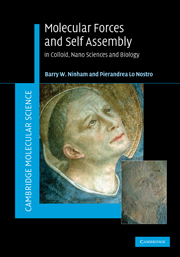Book contents
- Frontmatter
- Contents
- Preface
- Part I Molecular forces
- 1 Reasons for the enquiry
- 2 Different approaches to, and different kinds of, molecular forces
- 3 Electrostatic forces in electrolytes in outline
- 4 The balance of forces
- 5 Quantum mechanical forces in condensed media
- 6 The extension of the Lifshitz theory to include electrolytes and Hofmeister effects
- 7 Specific ion effects
- 8 Effects of dissolved gas and other solutes on hydrophobic interactions
- Part II Self assembly
- Index
- References
6 - The extension of the Lifshitz theory to include electrolytes and Hofmeister effects
from Part I - Molecular forces
Published online by Cambridge University Press: 06 January 2011
- Frontmatter
- Contents
- Preface
- Part I Molecular forces
- 1 Reasons for the enquiry
- 2 Different approaches to, and different kinds of, molecular forces
- 3 Electrostatic forces in electrolytes in outline
- 4 The balance of forces
- 5 Quantum mechanical forces in condensed media
- 6 The extension of the Lifshitz theory to include electrolytes and Hofmeister effects
- 7 Specific ion effects
- 8 Effects of dissolved gas and other solutes on hydrophobic interactions
- Part II Self assembly
- Index
- References
Summary
Inclusion of electrolytes and Hofmeister effects in the theory
We have seen that the classical theories of electrolytes are limiting laws that are strictly valid, if at all, at very low concentrations. That is so for the Born self energy, the correlation free energy of Debye–Hückel theory, the interfacial tension of electrolytes represented by Onsager's theory, and the double-layer theory of interactions between charged colloidal particles. These theories ignore water structure, hydration, induced by ions. They also ignore dispersion interactions between ions and between ions and surfaces. In reality, with moderate salt concentrations of interest in biology (> 0.1 M) strong specific ion effects emerge. These effects can be taken into account by introducing more (unquantified) parameters that attempt to build in hard core interactions, local ‘water structure’ and overlap of hydration shells. But even with such extensions, the parameters vary from one situation to another. For example, the double-layer forces between the cationic bilayers of Chapter 4 differ by more than an order of magnitude with sodium bromide or sodium acetate at concentrations as low as 10−3 M! This is entirely unsatisfactory. A theory of electrolytes that deserves the name ought to work predictively for all electrolytes.
As a first step to throwing some light on the problem, we here address how to build a theory that includes the missing dispersion forces together with electrostatics.
- Type
- Chapter
- Information
- Molecular Forces and Self AssemblyIn Colloid, Nano Sciences and Biology, pp. 112 - 145Publisher: Cambridge University PressPrint publication year: 2010

